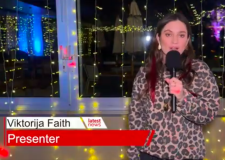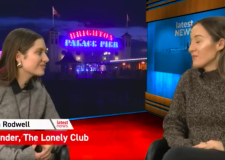Interview: Everything Everything
Everything Everything talk to jeff hemmings about exploring The New Complexity
With other bands such as alt-j, Foals and Django Django exploring the boundaries of pop-rock and tinkering with traditional notions of song structure, The New Complexity, as it has been called, has seen an adventurist, yet popular, spirit take hold in the world of alt-indie. Everything Everything, however, prefer to see themselves as simply a pop band, albeit one that does deliver a technicoloured and multifaceted sound that speaks of sophistication and invention, whilst remaining very accessible, often joyous, and often sublime.
Certainly, EE are a remarkably intelligent band, made up of members who are deep thinkers. Original member Alex Niven left the band to become a full-time writer and poet, and is currently working at New Left Review, the highly regarded bi-monthly politics magazine. He, along with singer Jonathan Higgs and drummer Michael Spearman are all from Northumbria, and met at school in Hexham where they played music together. Another Alex – Robertshaw – took over guitar duties in 2009. Whilst at Salford University studying for a degree in Popular Music and Recording, Higgs met Jeremy Pritchard (bass), and plans were hatched to form a band after studies. Niven, Spearman, Higgs and Pritchard were to convene to start what Niven has called “…a sort of Paul Morley-inspired, poptimist aesthetic”, exemplified by the name they took, a kind of everyday word dressed up in some kind of universality… “It was the only one we liked at the time,” says Michael Spearman. “We have subsequently realised it was lyrics from (Radiohead’s) Kid A, although I think it was subconscious. We just liked the word, and the word next to it again, and the sound of it, and the look of it even… it has a kind of expansive, inclusiveness to it. Some people think we are some way elitist, but that is in no way our agenda. We always wanted to make hooky melodies because we wanted people to sing along. We like everything from Captain Beefheart to Beyonce.”
Meanwhile, Higgs has commented about their music: “We think of it as pop primarily. We try not to make it sound like a lot of things you’ve heard before, not on purpose, but it tends to come out a bit like that. We’re not really interested in copying certain genres or anything, so I guess you’d say it’s unpredictable and sort of surprising.”
After their first rehearsal in September 2007, events moved swiftly for the band, their debut single Suffragette Suffragette released the following year, and they made it on to the esteemed BBC Sound Poll of 2010, a list created by Britain’s tastemakers who vote for their favourite new artists.
Get to Heaven, their third album released earlier this year, is their best yet, each song a mini-pop symphony, made up of at least two or more movements, but held together remarkably well; partly through Higg’s distinctive voice, that endlessly shifts gear from high speed rapping to high pitched falsetto; partly via the musical style of the individual band members, in particular the penchant for the caribbean/African picking of guitarist Alex Robertshaw, but also through the lyrics of Higgs, which are for the most part are serious, and thoughtful, often about socio-political themes and incidents, such as the rise of the far right and extremism, primal human nature, power, corruption and lies.
Perhaps most importantly, the band play off the seriousness and sombre-like qualities of the lyrics, with music that is playful, sometimes dancey, and rarely melancholy, hunting or morbid. “When John does interviews he talks about how a lot of the lyrics are angry, but when you listen to the album that is probably not the first thing you hear, although it is definitely in there… there’s plenty of bands who make angry records and angry music, but we like subverting things and being as interesting as we can.”
Much has been made of the lyrics of Higgs throughout Everything Everything’s oeuvre. Themes of media manipulation and political and social apathy litter their music. It’s all rather refreshing in this day and age when mainstream pop and rock is often afraid of discussing politics, economics and social affairs. “It’s quite angry, it’s quite defiant. It talks about – a lot of bands wouldn’t set foot in this area – things happening in the world, politically. I think lyrically he’s talking about things like what drives people to extremism. It feels like in the west that capitalism is something we’ve just grown up with, and it’s our way of life. On the whole, we are a kind of Godless society, and in the west there is this sense of not knowing what is meaningful any more. And then on the other side you’ve got this religious extremism, where they do really feel vehemently about what they are fighting for. Obviously, we can say they are wrong and that some of them are terrorists. But, It’s interesting looking at those two sides; apathy on one side – ‘isn’t the world awful. Never mind, I’ll go and get a coffee from Starbucks’ and on the other side some people are willing to kill themselves.
De La Warr Pavilion, Sun 8 Nov, 7pm, £17.50





















